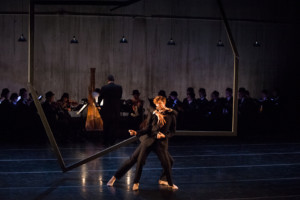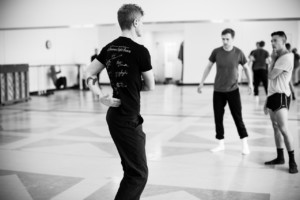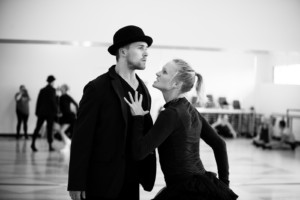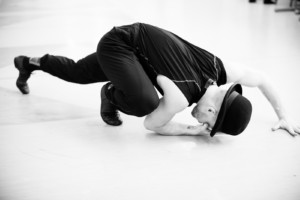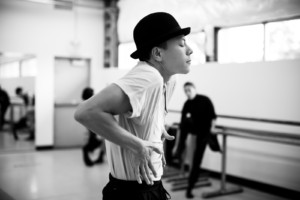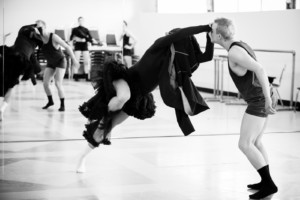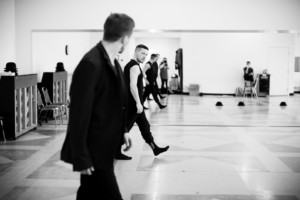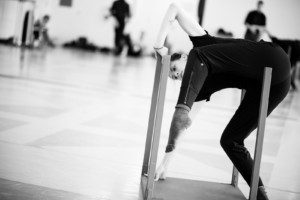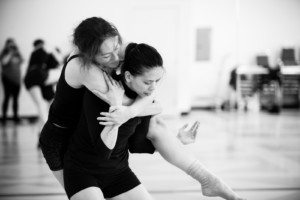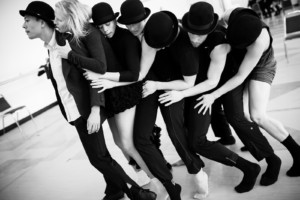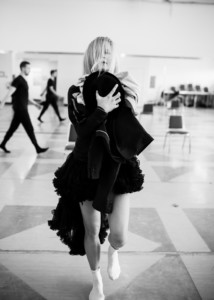The set was falling apart by the end of the run. “Is that a metaphor?” Whim W’Him director/choreographer Olivier wondered, “suggesting that it needed to be redone someday?”
Five years later, it’s happening. A new production of Approaching Ecstasy is being mounted, with sturdier, metal set pieces, a mostly different cast of dancers and many scenes cast in a different light. The remake of the acclaimed 2012 collaboration between Olivier with Whim W’Him and composer/ Esoterics founding director, Eric Banks, will be performed at the Cornish Playhouse in Seattle Center on June 2-3 and 9-10. [Whim W’Him: Approaching Ecstasy – Brown Paper Tickets]
On going back to watch to the video from the last-time-around, though, Olivier didn’t know if he was going to like it, and “I was afraid it would just be a re-staging—that I’d already used all its ideas.” But the piece is clearly rich enough to warrant the attention. He was reassured when “I could see what was the vision, though we couldn’t really do it then.” He also realized that the necessary dance resources are there now. Over the past five years Whim W’Him has become a real ensemble, no longer just a show-to-show pickup group. That, combined with Olivier’s own greater sense of what he wants, has improved his ability to articulate and develop his evolving style. And there has been so much time to rethink, rechoreograph, and refine—nearly two months of 5-day/week rehearsals. “I redid a lot, lots of things I improved on,” says Olivier. With a relieved grin he adds, “I’m glad that I am still growing, not stuck.”
The AE remake intrigues on multiple levels: as the abstracted life story of the gay Greek-Alexandrian poet Constantine Cavafy; a meditation of the relationship of an often-reluctant poet to his muse; and as a series of intimate perspectives, in choral music (alternate Greek and English-translation by Eric) and dance, on 18 love poems. One of the biggest changes, which enhances the continuity and helps to bring out the recurrent themes of the piece, is the longer, more integrated role danced by Tory Peil, which has grown out of Kaori Nakamura‘s part in the original. This new muse is one with a very distinct personality. She not only embraces and inspires the poet but is a voice in his head, a creature of his own mind, who cajoles, teases, flirts with and buzzes at him, scolds, nags and won’t let him go—a literary bee in his bonnet.
At the start of the piece after a short musical introduction, the dancers enter upstage one by one.
Clad in stylized 1920s men’s suits, they introduce themselves in brief diagonal passages exiting at the opposite downstage corner. These are very particular individuals interpreting broad poetic themes (such as secrecy and voicelessness), in their own fashion.
The allusive/elusive style of the piece, is more fluid, less on again off again than it was first time round, when the singers always sang in both languages but the dancers only danced to Greek. Except for Tory, who was in the original production but not in her present guise, all the dancers take on multiple roles—poet or lover or yearner, dreamer or dream—in various combinations. Their interactions with the muse-character make it clearer now that several of them are incarnations of Cavafy himself.
Some of the poem-vignettes haven’t changed much, except (mostly) in their personnel and the way the dance is no longer limited to just the sections sung in Greek. For the poem ‘In the Vestibule,’ the fascinating mirror scene is kept intact, though danced now by Karl Watson and Patrick Kilbane, including the breaking-of-the-mirror sequence and the return to everyday buttoned-up life.
As the two dancers face each other, moving sideways across the stage, one has the impression that the tale is being told from the point of view of the besotted mirror, that is Patrick whose fiercely intense face is the one we can observe, though Olivier assures me that we don’t actually know which of the characters actually is the mirror.
In ‘With the touch of his hands,’ the acrobatic and much-admired solo Andrew Bartee danced with a table, the poet’s writing desk is now brought in by the muse, who eventually leaves the writer (Liane Aung, in this instance) to struggle with this physical manifestation of language, getting almost literally tied up in knots.
A fine example of a section which was there in essence, but which the development of Olivier’s style and his company comprehension of it has allowed to develop further, is the women’s duet for the ‘Senses.’ Five years ago it was fascinating to watch the two dancers, Chalnessa Eames and Tory Peil, grapple with the complications, both physical and cognitive, of a sequence in which both dancers partner, with neither taking the leading or supporting role. Now that kind of relationship, in which both participants in a pas de deux are equal partners, is something all Whimmers, in whatever combination of gender they dance, understand from the moment they join the company. It is one of the qualities sought in auditions.
The revitalization, greater continuity and increased sophistication of the new production is particularly visible in the totally re-choreographed ‘Obstacles.’
After all I have said, and after all I have done,
Let no one discover who I truly was.
Obstacles stood before me and transformed me;
They altered my actions, and changed the way that I lived.
Obstacles stood before me and brought me to a standstill;
They silenced me whenever I wanted to speak out.
From my unnoticed actions
To my most surreptitious deeds,
By these things alone others will know me.
However, it may not be worth all the effort
Or painstaking care – just to find out who I was.
In the future, in a more perfect world,
Some fortunate man, created just like I am, will find himself
Able to live without shamefulness or hesitation, and be free.
For this beautiful and moving poem, dancing dancers and singing singers will intermingle across the stage, until Jim Kent, standing in here for Cavafy, is stripped down to his basic self, and the muse or poet’s inner self gathers his clothes, then flings them aside to stand motionless, one hand hiding her face. We still are not there yet…
Photo credit: Bamberg Fine Art Photography

